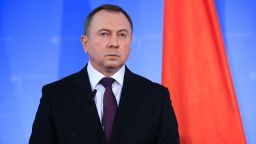A prominent Belarusian opposition figure, who has been serving an 11-year prison sentence after leading mass street protests against President Alexander Lukashenko, is in intensive care after undergoing surgery, an opposition spokesman said Tuesday.
Maria Kolesnikova was taken to a hospital in the southeastern city of Gomel, placed in a surgical ward and later transferred to the intensive care unit, Gleb Germanchuk, a spokesman for Kolesnikova, told CNN. She is in a stable but “difficult state, with some improvement,” he said.
Kolesnikova was placed in a “punishment cell” prior to her hospitalization for not being at her prison “workplace” when she was supposed to be there, Germanchuk said, citing her lawyer, Vladimir Pylchenko.
Worries are mounting about her well-being as Pylchenko has not been able to see Kolesnikova in hospital. Her lawyer could not get through to her in the hospital as by the time he arrived there were no doctors left to let him in, Germanchuk said.
Her lawyer sent a number of appeals to prison officials regarding concerns about her health, Germanchuk said. Kolesnikova’s relatives cannot visit her in hospital because she is a prisoner, and the same restrictions apply to her hospital stay, Germanchuk said.
The United States Embassy in Minsk said Tuesday it is “closely watching” reports of Kolesnikova’s “sudden hospitalization.”
“We hope she receives full and excellent medical care and recovers quickly,” the US Embassy tweeted. “The US remains committed to accountability for regime officials who violate human rights.”
Kolesnikova, a musician-turned-activist, was one of three women who joined forces in 2020 to front the opposition’s campaign against Lukashenko after prominent male opposition candidates were barred from the presidential race.
The trio were the face of a protest movement that sent tens of thousands of Belarusians onto the streets to demand political change during the country’s election. The demonstrators, as well as independent observers, alleged that the vote was rigged to extend Lukashenko’s 27-year rule.
President Lukashenko denied electoral fraud and authorities responded to the protests with a crackdown.
Kolesnikova was arrested in 2020 and taken to the border, where she was ordered to leave the country. Instead, she reportedly ripped up her passport, refusing to be forced into exile.
She was charged in September 2021 with extremism and conspiring to “seize state power in an unconstitutional way,” and sentenced to 11 years in prison.
The US and several European countries have condemned the court’s ruling and have called for Kolesnikova’s release.
As part of her stay in prison, Kolesnikova had to do correctional work, which included seaming uniforms for the Belarusian army, Germanchuk said.


